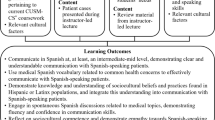Abstract
Background
Clinical performance examinations (CPX) with standardized patients (SPs) have become a preferred method to assess communication skills in US medical schools. Little is known about how trainees’ backgrounds impact CPX performance.
Objective
The objective of this paper is to examine the impact of student ethnicity, primary childhood language, and experience of diversity on the communication scores of a high-stakes CPX using SPs.
Design
This research was designed as an observational study.
Participants
The participants of this study were third-year medical students at one US medical school.
Measurements and Main Results
The measurements used in this study were CPX scores from mandatory exam, student demographics and experience with diversity measured by self-report on a survey, and Medical College Admission Test (MCAT) and United States Medical Licensing Examination (USMLE) scores. A total of 135 students participated. Asian and black students scored lower than white students on the communication portion of the CPX by approximately half a standard deviation (Asian, 67.4%; black, 64.4%; white, 69.4%, p < .05). There were no differences by ethnicity on history/physical exam scores. Multivariate analysis controlling for MCAT verbal scores reduced ethnic differences in communication scores (Asian–white mean differences = 1.95, p = 0.02), but Asian–white differences were eliminated only after sequential models included primary childhood language (difference = 0.57, p = 0.6).
Conclusions
Even after controlling for English language knowledge as measured in MCAT verbal scores, speaking a primary childhood language other than English is associated with lower CPX communication scores for Asian students. While poorer communication skills cannot be ruled out, SP exams may contain measurement bias associated with differences in childhood language or culture. Caution is indicated when interpreting CPX communication scores among diverse examinees.
Similar content being viewed by others
References
Irby DM, Wilkerson L. Educational innovations in academic medicine and environmental trends. J Gen Intern Med. 2003;18(5):370–6.
Pena Dolhun E, Munoz C, Grumbach K. Cross-cultural education in U.S. medical schools: development of an assessment tool. Acad Med. 2003;78(6):615–22.
Epstein RM, Hundert EM. Defining and assessing professional competence. JAMA. 2002;287(2):226–35.
Hauer KE, Hodgson CS, Kerr KM, et al. A national study of medical student clinical skills assessment. Acad Med. 2005;80(10 suppl):25S–9S.
Smedley BD, Stith AY, Nelson AR, eds. Unequal treatment: confronting racial and ethnic disparities in health care. Committee on Understanding and Eliminating Racial and Ethnic Disparities in Health Care, Institute of Medicine. Washington, DC: National Academies Press; 2003.
Adams D. Cultural competency now law in New Jersey. http://www.amednews.com. 2005.
Williams RG. Have standardized patient examinations stood the test of time and experience? Teach Learn Med. 2004;16(2):215–22.
Wass V, Roberts C, Hoogenboom R, et al. Effect of ethnicity on performance in a final objective structured clinical examination: qualitative and quantitative study. BMJ. 2003;326(7393):800–3.
Swartz MH, Colliver JA, Robbs RS. The interaction of examinee’s ethnicity and standardized patient’s ethnicity: an extended analysis. Acad Med. 2001;76(10 suppl):96S–8S.
Colliver JA, Swartz MH. Assessing clinical performance with standardized patients. JAMA. 1997;278(9):790–1.
Van Zanten M, Boulet JR, McKinley DW. Correlates of performance of the ECFMG clinical skills assessment: influences of candidate characteristics on performance. Acad Med. 2003;78(10 suppl):72S–4S.
van Zanten M, Boulet JR, McKinley DW. The influence of ethnicity on patient satisfaction in a standardized patient assessment. Acad Med. 2004;79(10 suppl):15S–7S.
Rees C, Sheard C. The relationship between medical students’ attitudes towards communication skills learning and their demographic and education-related characteristics. Med Educ. 2002;36(11):1017–27.
Lang F, McCord R, Harvill L, et al. Communication assessment using the common ground instrument: psychometric properties. Fam Med. 2004;36(3):189–98.
Heine N, Garman K, Wallace P, et al. An analysis of standardised patient checklist errors and their effect on student scores. Med Educ. 2003;37(2):99–104.
Brennan RL. Generalizability theory. New York: Springer; 2001.
Yedidia MJ, Gillespie CC, Kachur E, et al. Effect of communications training on medical student performance. JAMA. 2003;290(9):1157–65.
Donnon T, Paolucci EO, Violato C. The predictive validity of the MCAT for medical school performance and medical board licensing examinations: a meta-analysis of the published research. Acad Med. 2007;82(1):100–6.
AAMC. http://www.aamc.org/students/mcat/examineedata/combined01.pdf. Accessed July 2, 2006.
Perloff RM, Bonder B, Ray GB, et al. Doctor–patient communication, cultural competence, and minority health: theoretical and empirical perspectives. Am Behav Sci. 2006;49(6):835–52.
Cooper LA, Roter DL, Johnson RL, et al. Patient-centered communication, ratings of care, and concordance of patient and physician race. Ann Intern Med. 2003;139(11):907–15.
Saba GW, Wong ST, Schillinger D, et al. Shared decision making and the experience of partnership in primary care. Ann Fam Med. 2006;4(1):54–62.
Henry SG. A piece of my mind. Playing doctor. JAMA. 2005;294(17):2138–40.
Rose M, Wilkerson L. Widening the lens on standardized patient assessment: what the encounter can reveal about the development of clinical competence. Acad Med. 2001;76(8):856–9.
Acknowledgment
Dr. Fernandez’ efforts were supported by NIH K23 RR018324-01. Ms. Wang was partially supported by HRSA grant D54HP03400. We gratefully acknowledge input from the USCF ESCape WIP group and Pat O’Sullivan, Ph.D., and thank Eric Vittinghoff, Ph.D., for statistical advice and Kathleen Kerr for editing.
Conflict of Interest
None disclosed.
Author information
Authors and Affiliations
Corresponding author
Rights and permissions
About this article
Cite this article
Fernandez, A., Wang, F., Braveman, M. et al. Impact of Student Ethnicity and Primary Childhood Language on Communication Skill Assessment in a Clinical Performance Examination. J GEN INTERN MED 22, 1155–1160 (2007). https://doi.org/10.1007/s11606-007-0250-0
Received:
Accepted:
Published:
Issue Date:
DOI: https://doi.org/10.1007/s11606-007-0250-0




